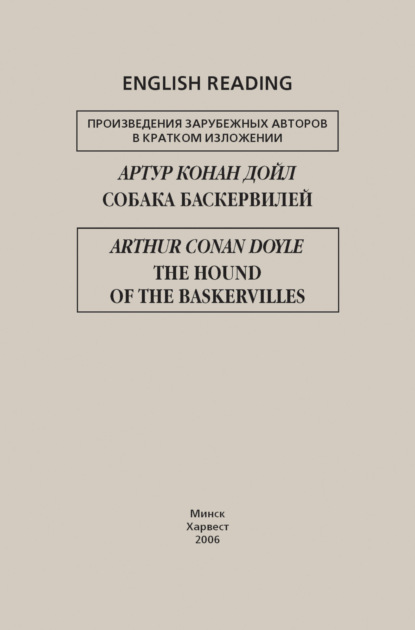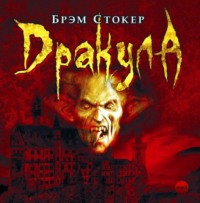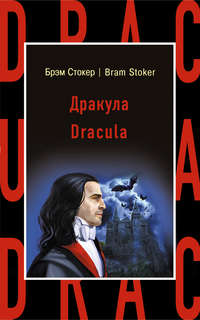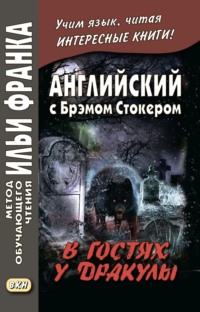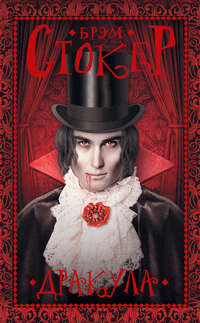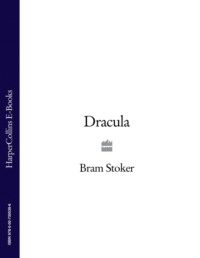
Полная версия
Дракула / Dracula
18 June.—He has turned his mind now to spiders, and has got several very big fellows in a box. He keeps feeding them his flies, and the number of the latter is becoming sensibly diminished, although he has used half his food in attracting more flies from outside to his room.
1 July.—His spiders are now becoming as great a nuisance as his flies, and today I told him that he must get rid of them.
He looked very sad at this, so I said that he must some of them, at all events. He cheerfully acquiesced in this, and I gave him the same time as before for reduction.
He disgusted me much while with him, for when a horrid blowfly, bloated with some carrion food[103], buzzed into the room, he caught it, held it exultantly for a few moments between his finger and thumb, and before I knew what he was going to do, put it in his mouth and ate it.
I scolded him for it, but he argued quietly that it was very good and very wholesome, that it was life, strong life, and gave life to him. This gave me an idea, or the rudiment of one. I must watch how he gets rid of his spiders.
He has evidently some deep problem in his mind, for he keeps a little notebook in which he is always jotting down something. Whole pages of it are filled with masses of figures, generally single numbers added up in batches, and then the totals added in batches again[104], as though he were focussing some account, as the auditors put it.
8 July.—There is a method in his madness, and the rudimentary idea in my mind is growing. It will be a whole idea soon, and then, oh, unconscious cerebration, you will have to give the wall to your conscious brother.
Dr. Seward did not visit Renfield for a few days in order to see some changes. It turned out that the patient had parted with most of his flies and spiders but had got a whole colony of sparrows whom he had tamed. One day when nearly a fortnight had passed he begged the doctor to have a cat but Dr. Seward refused him. After awhile he visited Renfield again. He did not see his birds and asked him where they were. Renfield replied that they had all flown away. There were a few feathers about the room and on his pillow a drop of blood. It turned out that the man had eaten the birds.
20 July.—My homicidal maniac is of a peculiar kind. I shall have to invent a new classification for him, and call him a zoophagous (life-eating) maniac. What he desires is to absorb as many lives as he can, and he has laid himself out to achieve it in a cumulative way. He gave many flies to one spider and many spiders to one bird, and then wanted a cat to eat the many birds. What would have been his later steps?
MINA MURRAY’S JOURNAL26 July.—I am anxious, and it soothes me to express myself here. It is like whispering to one’s self and listening at the same time. And there is also something about the shorthand symbols that makes it different from writing. I am unhappy about Lucy and about Jonathan. I had not heard from Jonathan for some time, and was very concerned, but yesterday dear Mr. Hawkins, who is always so kind, sent me a letter from him. I had written asking him if he had heard, and he said the enclosed had just been received. It is only a line dated from Castle Dracula, and says that he is just starting for home. That is not like Jonathan. I do not understand it, and it makes me uneasy.
Then, too, Lucy, although she is so well, has lately taken to her old habit of walking in her sleep. Her mother has spoken to me about it, and we have decided that I am to lock the door of our room every night.
Mrs. Westenra has got an idea that sleep-walkers always go out on roofs of houses and along the edges of cliffs and then get suddenly wakened and fall over with a despairing cry that echoes all over the place.
Poor dear, she is naturally anxious about Lucy, and she tells me that her husband, Lucy’s father, had the same habit, that he would get up in the night and dress himself and go out, if he were not stopped.
Lucy is to be married in the autumn, and she is already planning out her dresses and how her house is to be arranged. I sympathise with her, for I do the same, only Jonathan and I will start in life in a very simple way, and shall have to try to make both ends meet.
Mr. Holmwood, he is the Hon. Arthur Holmwood, only son of Lord Godalming, is coming up here very shortly, as soon as he can leave town, for his father is not very well, and I think dear Lucy is counting the moments till he comes.
She wants to take him up in the seat on the churchyard cliff and show him the beauty of Whitby. I daresay it is the waiting which disturbs her. She will be all right when he arrives.
27 July.—No news from Jonathan. I am getting quite uneasy about him, though why I should I do not know, but I do wish that he would write, if it were only a single line.
Lucy walks more than ever, and each night I am awakened by her moving about the room. Fortunately, the weather is so hot that she cannot get cold. But still, the anxiety and the perpetually being awakened is beginning to tell on me, and I am getting nervous and wakeful myself. Thank God, Lucy’s health keeps up. Mr. Holmwood has been suddenly called to Ring to see his father, who has been taken seriously ill. Lucy frets at the postponement of seeing him, but it does not touch her looks. She is a trifle stouter, and her cheeks are a lovely rose-pink. She has lost the anemic look which she had. I pray it will all last.
3 August.—Another week gone by, and no news from Jonathan, not even to Mr. Hawkins, from whom I have heard. Oh, I do hope he is not ill. He surely would have written. I look at that last letter of his, but somehow it does not satisfy me. It does not read like him, and yet it is his writing. There is no mistake of that.
Lucy has not walked much in her sleep the last week, but there is an odd concentration about her which I do not understand, even in her sleep she seems to be watching me. She tries the door, and finding it locked, goes about the room searching for the key.
Chapter 7
CUTTING FROM “THE DAILYGRAPH”, 8 AUGUST (PASTED IN MINA MURRAY’S JOURNAL)From a correspondent.
Whitby.
One of the greatest and suddenest storms on record has just been experienced here, with results both strange and unique. The weather had been somewhat sultry, but not to any degree uncommon in the month of August. The wind was then blowing from the south-west in the mild degree which in barometrical language is ranked ‘No. 2, light breeze.’
The coastguard on duty at once made report, and one old fisherman, who for more than half a century has kept watch on weather signs from the East Cliff, foretold in an emphatic manner the coming of a sudden storm.
More than one captain made up his mind then and there that his ‘cobble’ or his ‘mule’, as they term the different classes of boats, would remain in the harbour till the storm had passed. The wind fell away entirely during the evening, and at midnight there was a dead calm, a sultry heat, and that prevailing intensity which, on the approach of thunder, affects persons of a sensitive nature.
Shortly before ten o’clock the stillness of the air grew quite oppressive.
Then without warning the tempest broke. With a rapidity which, at the time, seemed incredible, and even afterwards is impossible to realize, the whole aspect of nature at once became convulsed. The waves rose in growing fury, each over-topping its fellow, till in a very few minutes the lately glassy sea was like a roaring and devouring monster. White-crested waves beat madly on the level sands and rushed up the shelving cliffs.
Before long the searchlight discovered some distance away a schooner with all sails set. The wind had by this time backed to the east, and there was a shudder amongst the watchers on the cliff as they realized the terrible danger in which she now was.
Between her and the port lay the great flat reef on which so many good ships have from time to time suffered, and, with the wind blowing from its present quarter, it would be quite impossible that she should fetch the entrance of the harbour.
It was now nearly the hour of high tide, but the waves were so great that in their troughs[105] the shallows of the shore were almost visible, and the schooner, with all sails set, was rushing with such speed that, in the words of one old salt, “she must fetch up somewhere, if it was only in hell”.
The wind suddenly shifted to the northeast, and the remnant of the sea fog melted in the blast. And then, mirabile dictu[106], between the piers, leaping from wave to wave as it rushed at headlong speed, swept the strange schooner before the blast, with all sail set, and gained the safety of the harbour. The searchlight followed her, and a shudder ran through all who saw her, for lashed to the helm was a corpse, with drooping head, which swung horribly to and fro at each motion of the ship. No other form could be seen on the deck at all.
A great awe came on all as they realised that the ship, as if by a miracle, had found the harbour, unsteered save by the hand of a dead man! However, all took place more quickly than it takes to write these words. The schooner paused not, but rushing across the harbour, pitched herself on that accumulation of sand and gravel washed by many tides and many storms into the southeast corner of the pier jutting under the East Cliff, known locally as Tate Hill Pier.
There was of course a considerable concussion[107] as the vessel drove up on the sand heap. Every spar, rope, and stay was strained, and some of the ‘top-hammer’ came crashing down.[108] But, strangest of all, the very instant the shore was touched, an immense dog sprang up on deck from below, as if shot up by the concussion, and running forward, jumped from the bow on the sand.
It so happened that there was no one at the moment on Tate Hill Pier, as all those whose houses are in close proximity were either in bed or were out on the heights above. Thus the coastguard on duty on the eastern side of the harbour, who at once ran down to the little pier, was the first to climb aboard. The men working the searchlight, after scouring the entrance of the harbour without seeing anything, then turned the light on the derelict[109] and kept it there. The coastguard ran aft[110], and when he came beside the wheel, bent over to examine it, and recoiled at once as though under some sudden emotion. This seemed to pique general curiosity, and quite a number of people began to run.
It was no wonder that the coastguard was surprised, or even awed, for not often can such a sight have been seen. The man was simply fastened by his hands, tied one over the other, to a spoke of the wheel. Between the inner hand and the wood was a crucifix, the set of beads on which it was fastened being around both wrists and wheel, and all kept fast by the binding cords. The poor fellow may have been seated at one time, but the flapping and buffeting of the sails[111] had worked through the rudder of the wheel and had dragged him to and fro, so that the cords with which he was tied had cut the flesh to the bone.
In his pocket was a bottle, carefully corked, empty save for a little roll of paper, which proved to be the addendum to the log[112].
9 August.—The sequel to the strange arrival of the derelict in the storm last night is almost more startling than the thing itself. It turns out that the schooner is Russian from Varna, and is called the Demeter. She is almost entirely in ballast of silver sand, with only a small amount of cargo, a number of great wooden boxes filled with mould.
This cargo was consigned to a Whitby solicitor, Mr. S.F. Billington, of 7, The Crescent, who this morning went aboard and took formal possession of the goods consigned to him.
Later.—By the kindness of the Board of Trade inspector, I have been permitted to look over the log book of the Demeter, which was in order up to within three days, but contained nothing of special interest except as to facts of missing men. The greatest interest, however, is with regard to the paper found in the bottle, which was today produced at the inquest. And a more strange narrative than the two between them unfold it has not been my lot to come across.
LOG OF THE “DEMETER” Varna to WhitbyWritten 18 July, things so strange happening, that I shall keep accurate note henceforth till we land.
On the 6th of July the crew took the cargo, which consisted of silver sand and boxes of earth and set sail. On the 14th of July the crew started behaving themselves very strange, they were crossing themselves and kept saying about “something” on board. Then people from the crew started missing. Some of the sailors swore having seen a stranger on deck at night. So the captain decided to search the entire ship but found nothing except huge wooden boxes. Then there was a tempest and during it and after all the rest of the crew except the captain and the mate disappeared. On the 3rd of August, at midnight, the captain went to relieve the mate at the wheel but found no one there. After a few seconds, the mate rushed up on deck and told the captain that he had seen the stranger and even tried to kill him with a knife but the knife had gone through him without doing him any harm. So the mate was sure that the stranger had been hiding in one of the boxes and he set his mind on finding him. Some time afterwards the mate reappeared on the deck. He cried that he would better die in the sea than get into the hands of the monster and jumped into the water. After a while the captain had seen the horrible stranger himself. When his strength began to fail he decided to tie his hands with a cross in them to the wheel.
MINA MURRAY’S JOURNAL8 August.—Lucy was very restless all night, and I too, could not sleep. The storm was fearful, and as it boomed loudly among the chimney pots, it made me shudder. When a sharp puff came it seemed to be like a distant gun. Strangely enough, Lucy did not wake, but she got up twice and dressed herself. Fortunately, each time I awoke in time and managed to undress her without waking her, and got her back to bed. It is a very strange thing, this sleep-walking, for as soon as her will is thwarted in any physical way[113], her intention, if there be any, disappears, and she yields herself almost exactly to the routine of her life.
Early in the morning we both got up and went down to the harbour to see if anything had happened in the night. There were very few people about, and though the sun was bright, and the air clear and fresh, the big, grim-looking waves, that seemed dark themselves because the foam that topped them was like snow, forced themselves in through the mouth of the harbour, like a bullying man going through a crowd. Somehow I felt glad that Jonathan was not on the sea last night, but on land. But, oh, is he on land or sea? Where is he, and how? I am getting fearfully anxious about him. If I only knew what to do, and could do anything!
10 August.—The funeral of the poor sea captain today was most touching. Every boat in the harbour seemed to be there, and the coffin was carried by captains all the way from Tate Hill Pier up to the churchyard. Lucy came with me, and we went early to our old seat, whilst the cortege of boats went up the river to the Viaduct and came down again. We had a lovely view, and saw the procession nearly all the way. The poor fellow was laid to rest near our seat so that we stood on it, when the time came and saw everything. Poor Lucy seemed much upset. She was restless and uneasy all the time, and I cannot but think that her dreaming at night is telling on her. She is quite odd in one thing. She will not admit to me that there is any cause for restlessness, or if there be, she does not understand it herself.
I think it will be best for her to go to bed tired out physically, so I shall take her for a long walk by the cliffs to Robin Hood’s Bay and back. She ought not to have much inclination for sleep-walking then.
Chapter 8
MINA MURRAY’S JOURNAL11 August.—Diary again. No sleep now, so I may as well write. I am too agitated to sleep. We have had such an adventure, such an agonizing experience. I fell asleep as soon as I had closed my diary… Suddenly I became broad awake, and sat up, with a horrible sense of fear upon me, and of some feeling of emptiness around me. The room was dark, so I could not see Lucy’s bed. I stole across and felt for her. The bed was empty. I lit a match and found that she was not in the room. The door was shut, but not locked, as I had left it. I feared to wake her mother, who has been more than usually ill lately, so threw on some clothes and got ready to look for her. As I was leaving the room it struck me that the clothes she wore might give me some clue to her dreaming intention. Dressing-gown would mean house, dress outside. Dressing-gown and dress were both in their places. “Thank God,” I said to myself, “she cannot be far, as she is only in her nightdress.”
I ran downstairs and looked in the sitting room. Not there! Then I looked in all the other rooms of the house, with an ever-growing fear chilling my heart. Finally, I came to the hall door and found it open. It was not wide open, but the catch of the lock had not caught. The people of the house are careful to lock the door every night, so I feared that Lucy must have gone out as she was. There was no time to think of what might happen. A vague over-mastering fear obscured all details.
I took a big, heavy shawl and ran out. The clock was striking one as I was in the Crescent, and there was not a soul in sight. I ran along the North Terrace, but could see no sign of the white figure which I expected. At the edge of the West Cliff above the pier I looked across the harbour to the East Cliff, in the hope or fear, I don’t know which, of seeing Lucy in our favourite seat.
There was a bright full moon, with heavy black, driving clouds, which threw the whole scene into a fleeting diorama[114] of light and shade as they sailed across. For a moment or two I could see nothing, as the shadow of a cloud obscured St. Mary’s Church and all around it. Then as the cloud passed I could see the ruins of the abbey coming into view, and as the edge of a narrow band of light as sharp as a sword-cut moved along, the church and churchyard became gradually visible. Whatever my expectation was, it was not disappointed, for there, on our favourite seat, the silver light of the moon struck a half-reclining figure, snowy white. The coming of the cloud was too quick for me to see much, for shadow shut down on light almost immediately, but it seemed to me as though something dark stood behind the seat where the white figure shone, and bent over it. What it was, whether man or beast, I could not tell.
Конец ознакомительного фрагмента.
Текст предоставлен ООО «ЛитРес».
Прочитайте эту книгу целиком, купив полную легальную версию на ЛитРес.
Безопасно оплатить книгу можно банковской картой Visa, MasterCard, Maestro, со счета мобильного телефона, с платежного терминала, в салоне МТС или Связной, через PayPal, WebMoney, Яндекс.Деньги, QIWI Кошелек, бонусными картами или другим удобным Вам способом.
Примечания
1
Danube – Дунай
2
my smattering of German – мои скудные познания в немецком языке
3
that some foreknowledge of the country could hardly fail to have some importance in dealing with a nobleman of that country – мне казалось, что всякая мелочь, любые знания об этой стране окажутся полезными в общении с тамошним аристократом
4
Ordnance Survey Maps – военно-топографические карты
5
Saxons in the South, and mixed with them the Wallachs, who are the descendants of the Dacians; Magyars in the West, and Szekelys in the East and North – на юге саксонцы вперемешку с валахами – народом, происходящим от даков; на западе венгры и секли на востоке и севере
6
Huns– гунны
7
It was on the dark side of twilight – Уже ближе к ночи
8
casualties – количество умерших
9
will have full sway – войдет в полную силу
10
English Churchman – принадлежащий к англиканской церкви
11
rosary – четки
12
jagged – изломанный
13
werewolf – вурдалак
14
guard against the evil eye – защита от дурного глаза
15
whose wide linen drawers covered the whole front of the boxseat – чьи широченные холщовые штаны закрывали собой почти все козлы
16
conveyance – экипаж, повозка
17
caleche – коляска
18
he shook his reins – дернул вожжи
19
cracked his whip – щелкнул бичом
20
beetling – нависающий
21
sinewy limbs – мускулистые конечности
22
their true import – их истинную сущность
23
uncanny – жуткий
24
studded with large iron nails – усаженная крупными железными гвоздями
25
in which the flame burned without a chimney or globe of any kind – в котором пламя горело без какого бы то ни было стекла или абажура
26
aquiline – орлиный
27
with lofty domed forehead – высокий выпуклый лоб
28
extraordinary pallor – необычная бледность
29
his breath was rank – у него плохо пахло изо рта
30
protuberant teeth – сильно выступающие зубы
31
odd deficiencies – странные недостатки
32
dilapidated notice – потрепанное объявление
33
corruption of the old Quatre Face – искаженное старинное Quatre Faces – Четыре Лица
34
It looks like part of a keep – Напоминает башню замка
35
lunatic asylum – психиатрическая лечебница
36
voluptuousness – сладострастие
37
malignant and saturnine – злобный и жестокий
38
It was the better part of an hour – Прошел почти час
39
that I was getting too diffuse – что я становился слишком многословным
40
It may be that this strange night existence is telling on me – Вполне возможно, что мои странные ночные бдения дают о себе знать
41
and imagination must not run riot with me – я не должен давать волю своей фантазии
42
with occasionally a deep rift where there is a chasm – с редкими просветами там, где открывается пропасть
43
veritable – настоящий
44
conviction of my helplessness – осознание собственной беспомощности
45
through the chink of the hinges of the door – сквозь щели в дверях
46
menial offices – обязанности прислуги
47
tangible – осязаемый
48
not to awake his suspicion – чтобы не вызвать у него подозрений
49




